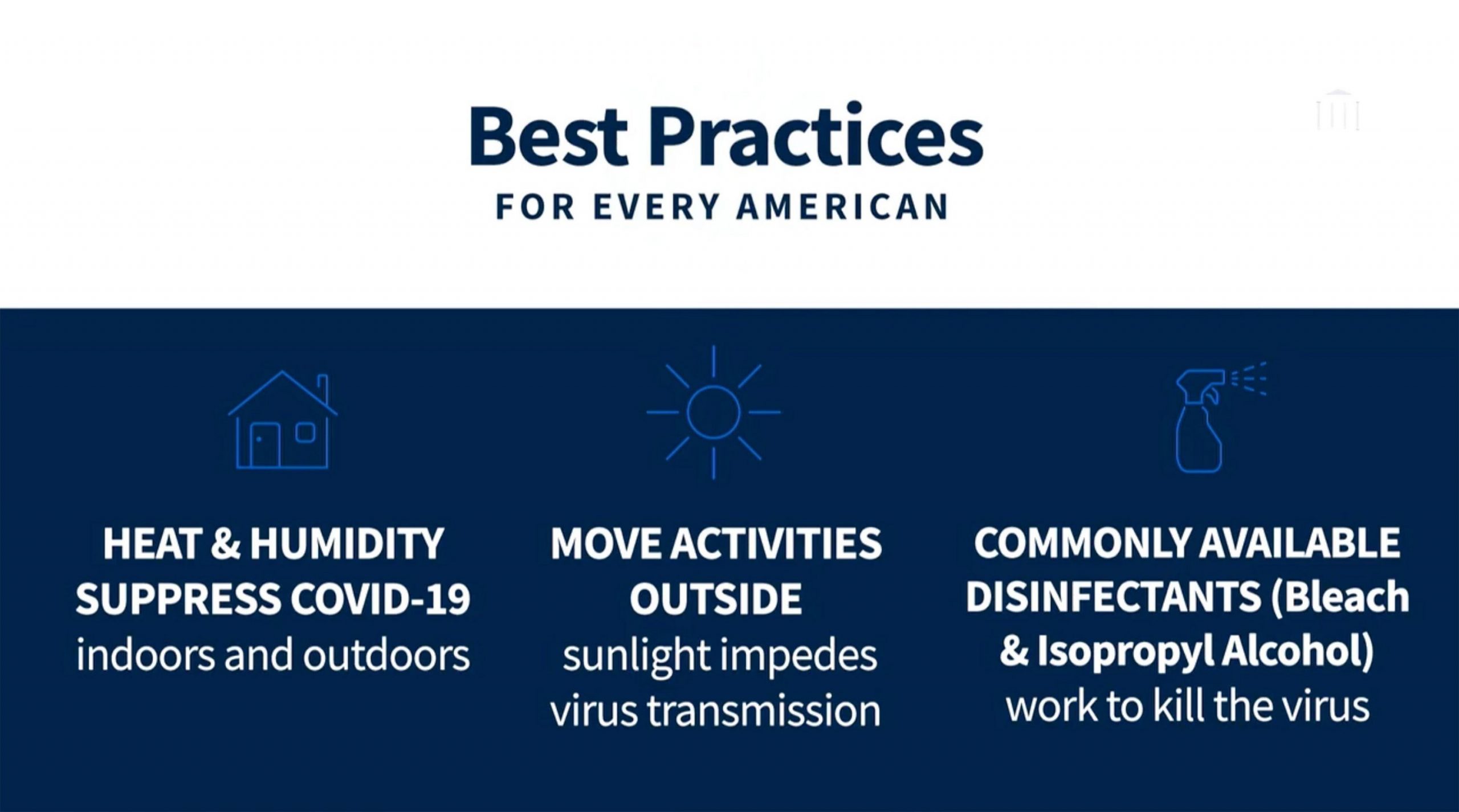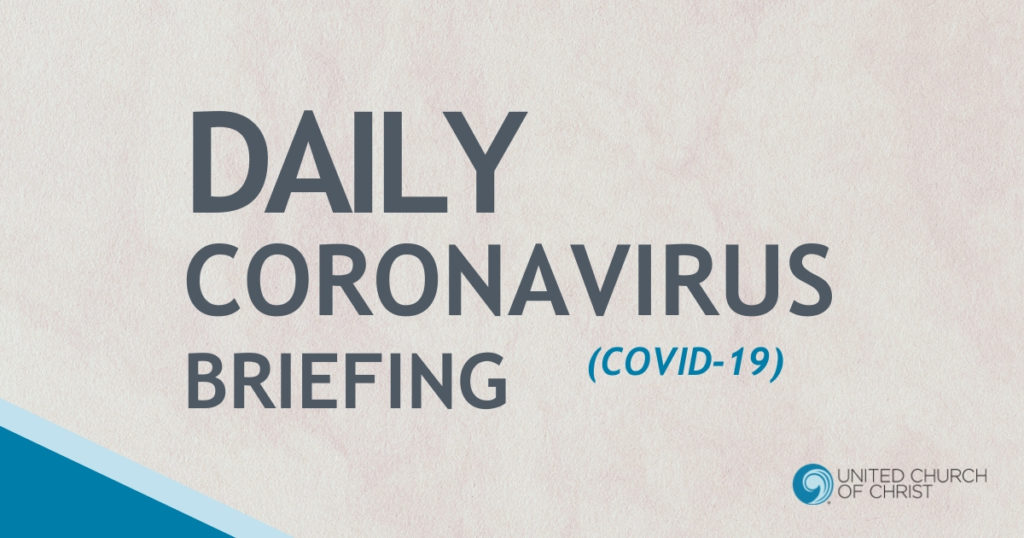Inject/ingest disinfectant for COVID-19? No way!
United Church of Christ – Wider Church Ministries
Humanitarian Development Team
Coronavirus (COVID-19) Daily Briefing
Barbara T. Baylor, MPH – Temporary Health Liaison
Ingest/inject disinfectants to treat COVID-19?!
At Thursday’s daily briefing at the White House, President Trump seductively suggested that possible treatments for COVID-19 might include the use of ultraviolet rays outside and/or inside the body, and ingestion or injection of disinfectants (e.g. bleach, Isopropyl alcohol, Lysol, Clorox) into patients to clean their lungs.
Sit with that for a minute!
Now let’s be 100 percent clear right up front. Agents that are commonly used to kill the virus in the environment are toxic to the body when ingested or injected. Ingesting or injecting these chemicals will NOT get rid of the virus. To the contrary, taking these chemicals into the body will harm or even kill people. Read the labels! AND PLEASE DO NOT INGEST OR INJECT THESE OR ANY OTHER DISINFECTANTS!
The President of the United States made his statement after hearing a presentation by Bill Bryan, Director Homeland Security Science and Technology Division, on research conducted by his team showing that COVID-19 doesn’t live as long in warmer temperatures and higher humidity.
A ‘”best practices” graphic posted at the briefing stated that “Heat & Humidity suppress COVID-19,” which should indicate that we “move activities outside” because “sunlight impedes virus transmission.” Meaning that the virus dies quickest in sunlight, which contains UV rays.
The team’s research also noted that commonly available disinfectants, bleach and Isopropyl alcohol “work to kill the virus.” Bryan indicated that bleach can kill the virus in five minutes and Isopropyl alcohol within 30 seconds with no manipulation in saliva (boldface and italics here are mine).
That’s another dangerous statement! Might Bryan tempt people to rinse their mouths or gargle with household disinfectants?! DO NOT EVEN CONSIDER DOING THIS!
Let’s revisit the March 24, 2020, UCC COVID-19 Daily Briefing. Recall that when the President touted Hydroxychloroquine as a possible treatment for COVID-19, an elderly couple ingested some. Consequently, the husband died and the wife was hospitalized.
Words can kill! Watching our words and what we say is very important. The American public is already scared and wanting desperately to believe in anything that may lead to treatment of this virus, especially if it comes from the leader of our country. Fortunately, Bryan did state that federal laboratories aren’t considering these treatment options.
Let’s look more closely at the following graphic from Bill Bryan’s presentation:
 1. Heat and Humidity Suppress COVID-19.
1. Heat and Humidity Suppress COVID-19.
The hope that warmer air could suppress the virus is not entirely unfounded. Seasonal cycles are known to play a crucial role in the transmission of other respiratory viral illnesses, and the link between viral outbreak and the season has been the topic of much research.
According to immunobiologists at Yale University, when cold, dry air comes indoors and is warmed, the relative humidity indoors drops by about 20 percent. Such a drop in humidity makes it easier for airborne viral particles to travel. It is recommended that humidifiers are used during the winter in buildings.
In theory, scientists have found that higher temperatures are associated with lower disease incidence, but with COVID-19, there is simply not enough evidence to know if there will be a significant slowdown in infections as temperatures rise.
For now, the World Health Organization is still saying NO. The virus can be transmitted in ALL AREAS, including areas with hot and humid weather. Use protective measures in all climates.
2. Move activities outside. Sunlight impedes virus transmission.
One reason people might believe sunlight can kill the virus is because sunlight contains ultraviolet light. U.S. Centers for Disease Control aren’t sure the sun or heat will affect COVID-19 the same way.
High-intensity UV light can indeed be used to kill viruses on inanimate surfaces. But natural sunlight doesn’t provide the UV light intensity needed to kill the virus.
According to a research virologist at Emory University, Sunlight contains three types of ultraviolet light – UVA, UVB, and UVC. UVC rays are the most harmful, but these rays don’t reach us because they are filtered out by Earth’s atmosphere. UVC light is frequently used to sterilize equipment in medical settings and has been found to inactivate SARS (Acute Respiratory Syndrome) on equipment and other surfaces with 15 or more minutes’ exposure.
According to The World Health Organization, there is NO evidence that sun exposure kills the 2019 coronavirus and it is premature to assume that exposing oneself to heat and sunlight will temper the virus. WHO has warned that UV light of any kind can be harmful to eyes and skin. Do not use UV lamps to disinfect your body or to sterilize your hands.
3. Common disinfectants such as bleach and Isopropyl alcohol work to the kill the virus.
Bill Bryan said, “Disinfectants like bleach and Isopropyl alcohol can destroy the virus in saliva and respiratory fluids with 5 minutes and 30 seconds respectively.” (Again, this should not be construed as encouragement to rinse the mouth, gargle or ingest or inject these chemicals.)
About use of these disinfectants on surfaces, experts at the FDA, CDC and Consumer Reports say:
*Lysol, Clorox and similar products have long been touted as having the ability to kill 99.9 percent of germs, often on contact. Lysol’s label lists “human coronavirus” as one of the pathogens it can wipe out. But that isn’t the novel coronavirus now known as COVID-19; it’s the common cold.
*Unexpired bleach is likely to destroy the virus on hard surfaces. Prepare a bleach solution by mixing 5 tablespoons (1/3rd cup) bleach per gallon of water or 4 teaspoons bleach per quart of water.
*Alcohol. Rubbing alcohol products that are at least 70 percent alcohol will kill the coronavirus with less potential for damage than bleach. When using rubbing alcohol as a disinfectant or cleaner, don’t dilute it.
References:
Donald Trump suggests bizarre treatments for coronavirus including injections
Many common household cleaning products can kill coronavirus if you use them properly
Will the spread of COVID-19 be affected by changing seasons?
How humidity may affect COVID-19
No, sunlight has not been proven to kill coronavirus
Scientists try to figure out if summer will slow the spread of COVID-19
Trump suggests “injection” of disinfectant to beat coronavirus and to “clean” lungs
Related News
Planning for Earth Month: Resources for Congregations
April is Earth Month, and for congregations, it can be a great time to further discern how...
Read MoreBodily Autonomy Means Every-BODY
Advocacy and Action for Women's and Gender Justice Local events stir thoughts and...
Read MoreAn ally experiences PRIDE in the CLE
Advocacy and Action for Women's and Gender Justice Local events stir thoughts and...
Read More


